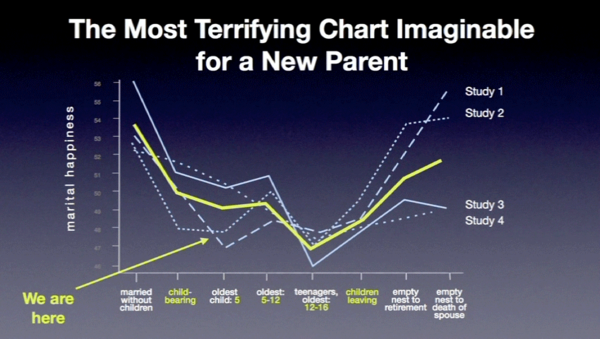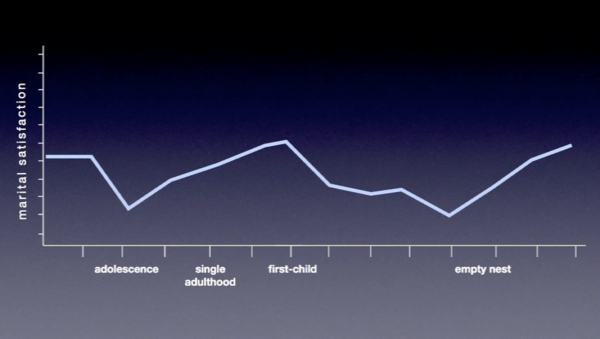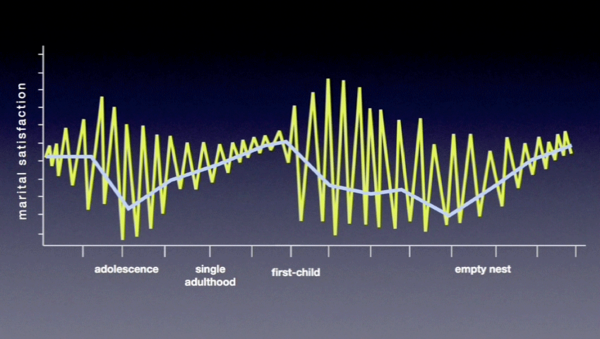Average Happiness vs Transcendent Moments
Do you guys watch videos on TED (tagline: “Riveting talks by remarkable people, free to the world”)? If not, you should — the site is filled with thought-provoking talks and discourses from some of the most exceptional people in the world.
Yesterday, TED posted a presentation given by Rufus Griscom and Alisa Volkman, the husband-and-wife team behind the popular websites Nerve and Babble. Their talk, titled “Let’s talk parenting taboos,” struck a chord with me because not only did they deliver it in a funny and enjoyable way, the content itself was honest and entirely relatable to where I am currently in my life.
Grisom and Volkman explores 4 truths that parents are taught by society never to admit…and why it is okay to talk about them:
- You can’t say you didn’t fall in love with your baby in the first minute
- You can’t talk about how lonely having a baby can be
- You can’t talk about your miscarriage
- You can’t say your “average happiness” has declined
Appropriately, these are all subjects I have discussed at length, or at least touched upon, on this blog.
I was particularly moved by the last topic where the couple talk about how a parent’s average happiness is likely to go down after having kids. Take a look at the chart below, where four independent studies measured marital satisfaction based on various milestones:
Taking a look at these studies, it is apparent that happiness takes a nosedive when children are introduced to the picture and does not go up again until your first child goes to college.
Intrigued by this data, Grisom and Volkman delved deeper into the studies by interviewing those who were responsible for the research. Are all parents doomed for at least two decades of misery? Why do people keep having kids if it makes them so unhappy?
What they discovered hit me hard. Here is a typical person’s average happiness over his/her lifespan:
What the graph above shows is average happiness, which does not account for moment-to-moment experiences. According to Grisom and Volkman, this is what the chart would look like if you overlay these moment-to-moment experiences:
As you can see, the chart accounts for the vastly undulating emotions that accompany childhood and adolescence, which levels off as we enter adulthood into our 20s and 30s. Or, as Griscom puts it, “it’s almost as age is a form of lithium.” Our average happiness goes up, but we lose those transcendent moments.
Then, when we have our first child, we submit ourselves to these highs and lows again…and never have the highs been any higher, or the lows any lower!
I couldn’t agree more.
As a new parent, there are times where I can’t even let out a single tear because I am so angry, so tired, and so damn frustrated. But these major lows are offset by equally powerful highs where I feel nothing but pure bliss. How every morning, the baby greets me and the new day with a smile. How holding her tight brings a surge of warmth throughout my entire body. How every night, she bursts out laughing as she enters dreamland.
And I know that these highs will get even higher as she grows older. (And the lows will get lower too.)
Seeing as the human race has continued to have children even with the introduction of birth control, I can only assume that these transcendent moments are worth the lower levels of average happiness for others too.





FB @ FabulouslyBroke.com
That's fascinating. I know it won't be perfect all the time with kids but overall I think it's worth it.
HamiHarri
This:
"But these major lows are offset by equally powerful highs where I feel nothing but pure bliss."
This makes it so worth it!
Creature Gorgeous (aka Perfume)
Three words: I.Hear.You.
kaylenohkaylen
Interesting! Is there a control version, where the highs and lows are tracked for people who do not have children/choose not to have children over their lifetime?
Clare
This is so interesting to me! My SIL just had a baby this past Saturday and I am still 4-5 years away from that point but this actually makes a lot of sense!
Geek in Heels
@kaylenohkaylen — I'd love to know that too! Unfortunately, Grisom and Volkman does not mention that.
serena @bigapplenosh
This is so interesting! I really enjoyed this post. Thanks for sharing 🙂
Jisoo
My BFF forwarded this to me so I watched it the other day. I couldn't identify with it more. Especially the whole thing about how lonely and isolating it can be right after having a baby. I did feel betrayed. I thought everyone was supposed to be happy when they have a baby immediately afterward.
Chappy
Very interesting and thank you for posting this to your blog.
I do have to point out though, that it is meaningless without a baseline to compare to (i.e. couples without kids). It is entirely possible that this graph is a result of many factors of life as you get older, for example increased work stress in your 30’s and 40’s as you take on more responsibility in your career progression, which would also negatively affect your “average” happiness.
Just my 2 cents, please don’t take it as criticism , but I think it is a large assumption that the graph is a result of the affects of having kids.
Hopefully someone can add this baseline at some stage.
Brooke
This makes me laugh a little. Honestly, I think my average happiness in my marriage went up since I had a baby (but, we are only 4 months in, so that can change). We were only married for seven months before I got pregnant, so there really wasn’t much to base it on either. Now, I feel more “sure” with out partnership. I don’t feel like he’s going anywhere, the risk is gone. I mean, he chose me to have a kid with. That really speaks volumes. Plus, I enjoy having the added purpose parenthood gives you.
Though, with that last chart, I can tell you very clearly when my lows happen. Right around 7 am, when I’m dying for more sleep and Charlie is wide awake and kicking the crap out of my belly while I cosleep desperate for her to sleep JUST ONE MORE HOUR! I think very nasty thoughts about my husband in those moments 😉 Thoughts of stabbing out his very well-rested eyes. With hot pokers. Then we eventually both fall back asleep and I wake up as chipper as can be. For a while at least, until the reality of parenting an infant kicks back in!
Ivars
” I can only assume that these transcendent moments are worth the lower levels of average happiness for others too.”
Bloody hell, sorry but they are not. Desire to overstate children positive impact on life in planing stage is textbook case of super-replication what comes afterwards are what humans do when there is only one unchangeable choice and the have done it – rationalize it using our wast arsenal of cognitive biases.